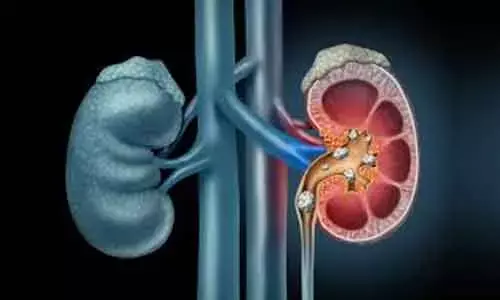- Home
- Medical news & Guidelines
- Anesthesiology
- Cardiology and CTVS
- Critical Care
- Dentistry
- Dermatology
- Diabetes and Endocrinology
- ENT
- Gastroenterology
- Medicine
- Nephrology
- Neurology
- Obstretics-Gynaecology
- Oncology
- Ophthalmology
- Orthopaedics
- Pediatrics-Neonatology
- Psychiatry
- Pulmonology
- Radiology
- Surgery
- Urology
- Laboratory Medicine
- Diet
- Nursing
- Paramedical
- Physiotherapy
- Health news
- Fact Check
- Bone Health Fact Check
- Brain Health Fact Check
- Cancer Related Fact Check
- Child Care Fact Check
- Dental and oral health fact check
- Diabetes and metabolic health fact check
- Diet and Nutrition Fact Check
- Eye and ENT Care Fact Check
- Fitness fact check
- Gut health fact check
- Heart health fact check
- Kidney health fact check
- Medical education fact check
- Men's health fact check
- Respiratory fact check
- Skin and hair care fact check
- Vaccine and Immunization fact check
- Women's health fact check
- AYUSH
- State News
- Andaman and Nicobar Islands
- Andhra Pradesh
- Arunachal Pradesh
- Assam
- Bihar
- Chandigarh
- Chattisgarh
- Dadra and Nagar Haveli
- Daman and Diu
- Delhi
- Goa
- Gujarat
- Haryana
- Himachal Pradesh
- Jammu & Kashmir
- Jharkhand
- Karnataka
- Kerala
- Ladakh
- Lakshadweep
- Madhya Pradesh
- Maharashtra
- Manipur
- Meghalaya
- Mizoram
- Nagaland
- Odisha
- Puducherry
- Punjab
- Rajasthan
- Sikkim
- Tamil Nadu
- Telangana
- Tripura
- Uttar Pradesh
- Uttrakhand
- West Bengal
- Medical Education
- Industry
People with Disabilities have increased Nephrolithiasis prevalence

According to a new study undertaken by Marlie Elia and colleagues, one in every three persons with nephrolithiasis is people with disabilities (PWD). Even after adjusting for many known risk factors, the odds of nephrolithiasis are higher in people with disabilities across all impairment domains.
The objective of this study was to assess the prevalence of nephrolithiasis in people with disabilities (PWD) while controlling for known risk factors for kidney stone illness.
The findings of this work were published in Journal of Urology.
For this work researchers calculated nephrolithiasis prevalence by functional disability type using answers to disability and kidney disease questionnaires from the 2013 to 2016 cycles of the National Health and Nutrition Examination Survey, a nationally representative cross-sectional survey conducted by the Centers for Disease Control. They also assessed the entire population of stone formers with impairments in the United States and compared disability prevalence among stone formers and non-stone formers. Using known correlates of nephrolithiasis, multivariate logistic regression models were constructed.
The results of this work stated as follow:
1. PWD accounts for 34.7 % (CI: 30.5 percent -39.1%) of stone-formers in the United States.
2. The prevalence of nephrolithiasis in persons with impairments is 16.1% (CI: 14.4-18.0), compared to 9.2% (CI: 8.3-10.3) in those without disabilities.
3. PWD have a considerably increased risk of nephrolithiasis (un-adjusted OR: 1.91 CI: 1.55-2.36).
4. Even after controlling for age, gender, race, diabetes, hypertension, and obesity, the chances of nephrolithiasis remain increased in PWD overall (adjusted OR: 1.46, 95% CI: 1.17-1.83) and across all handicap categories.
In conclusion, PWD are recognized as a distinct population with considerable health inequalities, yet there is a scarcity of research that assess urologic illness prevalence in this group. People with disabilities have higher prevalence of nephrolithiasis and may constitute a population with distinct health inequalities. Attempts to increase healthcare services to this demographic may be justified. To investigate possible inequities, future urologic research should include handicap status.
Reference:
Elia M, Monga M, De S. Increased Nephrolithiasis Prevalence in People with Disabilities: A National Health and Nutrition Survey Analysis. Urology. 2021 Oct 5:S0090-4295(21)00883-9. doi:10.1016/j.urology.2021.07.047. Epub ahead of print. PMID: 34619156.
Medical Dialogues consists of a team of passionate medical/scientific writers, led by doctors and healthcare researchers. Our team efforts to bring you updated and timely news about the important happenings of the medical and healthcare sector. Our editorial team can be reached at editorial@medicaldialogues.in.
Dr Kamal Kant Kohli-MBBS, DTCD- a chest specialist with more than 30 years of practice and a flair for writing clinical articles, Dr Kamal Kant Kohli joined Medical Dialogues as a Chief Editor of Medical News. Besides writing articles, as an editor, he proofreads and verifies all the medical content published on Medical Dialogues including those coming from journals, studies,medical conferences,guidelines etc. Email: drkohli@medicaldialogues.in. Contact no. 011-43720751


